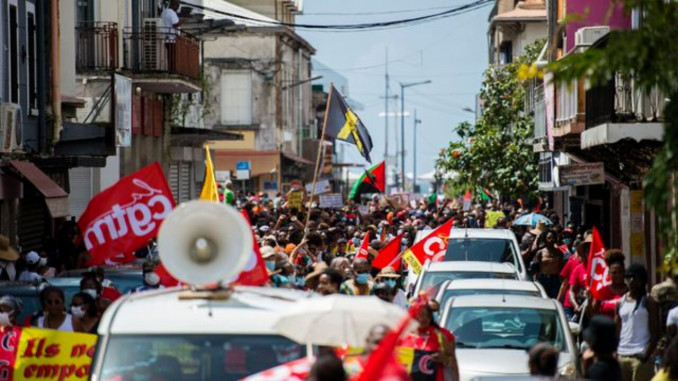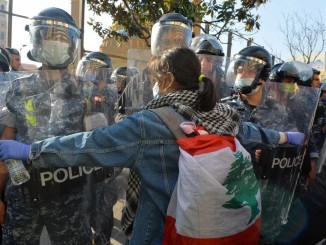
In the French West Indies, Guadeloupe and Martinique, an explosive social movement has been underway for weeks. It began with big protests this summer when the government imposed mandatory vaccination in workplaces and the institution of a health pass. But what triggered an all-out popular revolt was the suspension of about 2,000 health workers, and firemen, who refused to be vaccinated.
In the West Indies, the situation has to be understood on the terms existing in colonial territories that are formally part of France. Mistrust of the government is founded on a background of a litany of insults and treatment as second class citizens; the situation was a powder keg waiting for a spark. During the pandemic, the government saved money by leaving the hospitals without the barest necessities while the staff was forced to go to work without protective equipment. Now, forcing people to be vaccinated to protect the population’s health smacks of total hypocrisy. Added to this there is a huge scandal in Guadeloupe and Martinique around the use of chlordecone throughout the West Indies, a carcinogenic pesticide used in banana plantations. As a result of its widespread use, more than 90% of the adult population in Guadeloupe and Martinique has been poisoned, and the West Indians have the highest rate of prostate cancer in the world. Its harmful impact was well-known in the 1970s, and banned in the U.S. in 1976. It was only banned in France in 1990 but the French government authorized it by exemption in the West Indies at the request of the big plantation owners to give them time to sell their stock! The pesticide will persist in the soil for another 700 years.
As if that were not enough, there is also currently a water works scandal, and a resulting crisis as island residents face potable water shortages…in the midst of a pandemic. For decades the water system has not been maintained. The operators made profits without carrying out needed maintenance work. As a result, 60% of the drinking water leaks into the ground, and the population faces taps that run dry regularly. With this kind of context, the word of the government authorities regarding public health is not worth much in the minds of the workers and poor masses of the islands. While vaccination is a powerful way to fight the epidemic, authoritarian methods to impose it will not succeed.
In Guadeloupe and Martinique, the initial demands opposing mandatory vaccination and health passes were quickly overtaken by economic demands. The economic situation is terrible, and much worse than in metropolitan France: 17% unemployment and almost 50% of young people unemployed, and 34% of the population living below the poverty line, low wages, small retirement pensions, and very high prices – much higher than in metropolitan France. The result is an explosive situation. Since November 15 with the call for a general strike by most unions and popular political organizations, the two islands have been paralyzed by blockades and strikes. A list of 32 demands has been drawn up, including an end of compulsory vaccination, massive staffing increases in hospitals, material resources for health, and many other economic demands.
At first, the government’s response was to send in repressive forces to clear the blockades and arrest young people who were setting fire to cars and stores. But in the face of outrage, government repression is beginning to recede. At the time of this writing (December 1), the government has already given in slightly on two points: it has postponed the date by which staff are to be vaccinated to December 31, and announced the creation of 1,000 subsidized jobs for young people, as well as the finally recognized prostate cancer as an occupational disease, a popular demand for decades. It is a first victory, but not nearly the entirety of what the population is fighting for.
On Monday, November 29, the French Minister for Overseas Territories flew to Guadeloupe, supposedly to negotiate with workers’ organizations. But he demanded in advance that these organizations condemn the violence of protesters, which they of course refused to do. Four union spokespersons simply handed over the platform of demands to the Minister and demanded that the he meet with all of the union delegates together rather than only six of them, as he wanted. The discussion lasted 10 minutes. Since then, a meeting has been announced between unions, professional organizations and the representative of the State, to try to find some answers to the crisis.
At this point the blockades and strikes are continuing. The government has started to back down, but very slowly. As a result, the mobilization continues on both islands. The fight of the West Indian workers is our fight!




